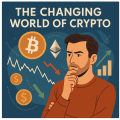

Table of Contents
The feeling
If you’re like me, you’ve had this strange, uneasy feeling about the job
market1
for a few years now.
It’s like a splinter in the brain. We know something is deeply broken
about the whole system, but it’s impossible to grasp or articulate.
I’m writing this because I think I figured it out.
People talk a lot about how AI is going to replace millions of jobs, and how
it will also create many more. I think that’s true, but I think there’s a
lot more going on here than just AI.
The symptoms
First, why do we even think there’s a problem? For me, it starts with
noticing how bad—and how often—work just completely sucks. Like the whole
thing—finding work, doing work, being stressed about not losing work. Etc.2
Most companies, departments, and teams are horribly inefficient, have very
little direction, are full of wasted time and efficiency, and are poorly
run. It’s constant meetings to talk about the latest corporate fuckery,
which only prevents you from doing what you should be doing. It’s change for
the sake of change. And when you get excited about a way to fix things,
either nobody listens, or they only pretend to before failing to implement
it.
Work tends to be a series of disappointments for most people, punctuated by
a few rays of light. I was curious about how many people felt this way—not
wanting to do a full essay on just my own opinions—and found
this from Gallup
about the quiet quitting phenomenon.
Gallup: Is Quiet Quitting Real?, 2023
The overall decline was especially related to clarity of expectations,
opportunities to learn and grow, feeling cared about, and a connection to
the organization’s mission or purpose—signaling
a growing disconnect between employees and their employers.
Many quiet quitters fit Gallup’s definition of being “not engaged” at
work—people who do the minimum required and are psychologically detached
from their job. This describes half of the U.S. workforce.
Is Quiet Quitting Real (Gallup)
I’m sure there are lots of factors going into Quiet Quitting, but I think
this feeling I’m talking about is one of them.
What I think is actually happening
And that brings me to what I think the real issues are, which are a lot
deeper and more unsettling than just, “AI is taking the jobs.”
The ideal number of employees in any company is zero. If a company
could run and make money using no people, then that is exactly what it
should do. We never think about this or talk about this because it’s very
strange and uncomfortable, but it is true. The purpose of companies is not
to employ people, it is to provide a product or service in return for money,
Because of that,
there is a constant downward pressure on anybody who is employed. It
is not a specific pressure from a specific person or department. It is
simply a fact of business reality that manifests itself in various ways
throughout an organization over time. We have to stop thinking of this as a
malicious thing where we should be employed, and they are trying to get rid
of us. The truth is exactly the opposite.
Nobody owes anybody a job. The only reason anyone has one is because
there was a problem at some point in that business that required a human to
do some part of the work. Building on that, if that ever becomes not the
case, for a particular person or team or department of human employees, the
natural next action is to get rid of them. Again, not because business
owners or managers are bad people or anything like that. We need to stop
injecting morality into this. Businesses simply should have as few employees
and actually any expense as possible.
A good way to think about this is to look at a list of software products
your company pays for. Let’s say your company pays for 215 software products that cost us
$420,000 a year to own and use. Nobody would object to somebody looking at
that list of software finding redundancies and canceling those licenses.
That is simply work that is being done by other software, or is not required
anymore, so it would be stupid for the business to not cancel or failed to
renew those licenses.
It is exactly the same with humans, and no matter what you read or hear,
I believe this is the main reason we are seeing disruption in job markets
today. I think more and more businesses are seeing themselves as money in and
money out, and are seeing human workers as being very expensive and
generally not very good at what they do. This is not necessarily because of
individual workers but because human organizations and communication are so
inefficient and wasteful. So basically, companies are realizing that they
are spending millions—or hundreds of millions—of dollars per year on human
talent, and they’re realizing it’s not worth it.
So that is 2 pieces: 1) ZERO is the optimum number of employees for any
company, and 2) companies are realizing that they’re paying way too much
for giant workforces that are not producing near the value being paid.
Forgetting any modern technological innovation, these two things combined
produce extreme downward pressure on the workforce. It adds pressure,
stress, drama, and all sorts of negativity to the practice of finding a job,
getting a job, keeping a job, working with coworkers, going through
organizational changes, and everything else that goes with being a regular
employee. It just basically fucking sucks. And the reason it sucks is
because companies ultimately wish that you didn’t exist in the first place.
We have forgotten that—or never learned it—and that needs to change.
Now let’s add AI, which if you’ve read any of the stuff I’ve been writing, you know is— in the context of business —a technology for replacing the
human intellectual work tasks that make up someone’s job.
Here’s a good example from a recent piece on this topic.
From ‘You’ve Been Thinking About AI All Wrong’
What this example shows is a workflow that a human worker does today—just
like millions of similar workflows—but that AI will soon be able to do instead.
It’s just steps, like we can see further down in the piece.
From ‘You’ve Been Thinking About AI All Wrong’
So now we have 3 pieces. The ideal number of employees is zero, companies
are extremely unhappy with their current workforces, and just now—starting
in 2023 and 2024—it is actually becoming possible to replace human
intelligence tasks with technology.
You have to see where this is going. It is not moving towards a few
jobs get removed, and a few jobs get added. It’s not moving towards some
gentle shifts in workforce dynamics or euphemisms like that. No, we are
talking about fundamental change. Now for the main point of this piece.
The entire concept of work that we have had for thousands of years was a
temporary model that was required to solve a temporary problem. Namely,
people who are trying to build or sell something that required work
they were unable to do by themselves.
Read that again.
The only reason anybody has a job is because some people are builders and
creators, and they cannot do the entire job themselves.
That work—which is required to produce those products and services—is the
reason people have 9-5 jobs. This is the reason the entire economy works the
way it does. Those builders/creators then hire people, who they have to pay,
and those people spend that money on things in the economy. And that is the
system we are all used to.
Well…
This system goes away when builders and creators can make things by
themselves. Which is precisely what AI is about to enable.
So, here’s where we are.
-
The ideal number of employees for a company is zero.
-
The reason companies had employees in the past is ONLY because the
founders couldn’t deliver their product/service without human workers. -
Companies and society has sort of forgotten this over the past decades
and it’s been kind of assumed that all companies should have these large
workforces, because it’s the job of companies to provide good jobs to
society. -
This hasn’t been working for companies, and company leaders are now
noticing that they’re not getting near the value they should be from
most employees and teams. -
So there’s already this realization sinking in, and then we are getting
AI at the exact same time. -
This means at the exact time that company leaders are looking very
skeptically at their human resources spending, they’re being presented
with an alternative.
OK, so maybe you’re thinking:
Holy crap—he’s right.
This is a horrible problem, and we are all screwed. What do I even do?
Yes, and no. I have three things to offer here that should make you feel
somewhat better.
3 reasons for hope
But it’s not all bad. I have 3 reasons for optimism.
1. Those jobs sucked anyway
How many people do you know who work regular 9 to 5 jobs in a knowledge work
environment who look forward to Monday? How many people, if you really stood
back and looked at your life, think it’s good to spend most of your waking
moments getting ready to work, dealing with dumbass work shit, all fucking
day, and then trying to destress from that day, just so you can actually
enjoy the few hours you have left to live your actual life?
All that so you can hopefully make it to Friday so you can have two days where you hopefully don’t have to think about
that hellscape you call work.
Is that the way humans should live on their home planet? If advanced and
benign aliens came and visited, and interviewed us, would they not see that
as a primitive state of being? Of course they would.
Bullshit Jobs, by David Graeber
The thing that we are about to lose is not something we should cry over. We
should be worried cause losing these jobs will be massively disruptive, and
it’s stressful as hell to think about a completely changed future. But these
Bullshit Jobs themselves are not something to cherish and remember.
2. Even fast things go slow
This transition will simultaneously happen very fast, but also pretty
slowly. Even if there is advanced AGI in 2025 (which would be very fast), it
still takes time for new technology to enter into companies and fully
replace previous technology or humans.
So it will take a while, and that’s not even taking into account likely
legislation that will slow it down even further based on how disruptive it
is. So it’s not like half of the workforce will suddenly not have a job in
2026. It will be very fast, but not that fast.
3. What comes after will be much better
And finally—and best of all—what we will be left with afterwards, assuming
we survive, will be a much better way to live.
That same AI that took our dumbass jobs away also has the potential to
produce extraordinary abundance for humanity, freeing us up to use our days
being human rather than
bad biological precursors to AI workers.
We weren’t supposed to be moving paperwork, and sorting spreadsheets, and
sending meeting invites, and writing computer code. It’s not what we were
supposed to be doing.
What we are supposed to be doing is building and creating things for each
other. Things that make each other‘s lives better, and richer, and more
meaningful.
And that is exactly what we will do on the other side of all of this. I
obviously don’t know our chances of making it to this other side, or if/when
it happens, exactly how that will play out. That is impossible to know,
but what I can tell you is that I am all in on that future, because it
doesn’t make sense to me to live any other way.
Sure, the disruption might tear us apart and send us back to the Bronze Age.
That’s possible too, but I choose to believe that we will make it out of
this. We’ll get out by getting through. And we’ll emerge on the other side
better for it.
Summary
-
The primary reason we’re seeing all this disruption in the job market is
because we’ve been part of a mass delusion about the very nature of
work. -
We told ourselves that millions of corporate workforce jobs—that pay
good salaries, have good benefits, and allow you to save for
retirement—were somehow a natural feature of the universe. -
In fact, that entire paradigm was just a temporary feature of our
civilization, caused by builders and creators not being able to do the
work required by themselves. And that’s going away. -
But it’s ok.
-
Most of the jobs sucked anyway, and they took up most of the daily
waking hours we were supposed to be spending with family and friends. -
Plus even if this transition happens really fast, it still won’t be
overnight. Big things take a while. -
And most importantly—what waits for us on the other side is a better way
to live. A more human way to live—where we identify as
individuals rather than corporate workers and exchange value and meaning
as part of a new human-centered economy.
My purpose in writing this is to give an alternative—and hopefully far more
satisfying—explanation of the feelings you might’ve been feeling for a very
long time. And to give you both some warning—and some hope—with which to
move forward.
I’ve oriented my life—since the end of 2022—around thinking about this
problem, providing ideas and frameworks around it, and have written
hundreds of articles about the problem and how to prepare for it. But rather than give the standard “subscribe to my newsletter” response,
I would just say that I’m easy to find.
Connect here and we can continue the conversation.
Website
|
X
|
Newsletter
|
Community
|
LinkedIn
We are going to get through this, and it will be much better once we do.
🫶
1 I’m talking about the knowledge work job market, like IT, etc., not
physical or professional work, although I do think they’ll be affected soon
as well.
2 I’m specifically speaking of the last few years, say, since 2020.

















0 responses on "The End of Work"